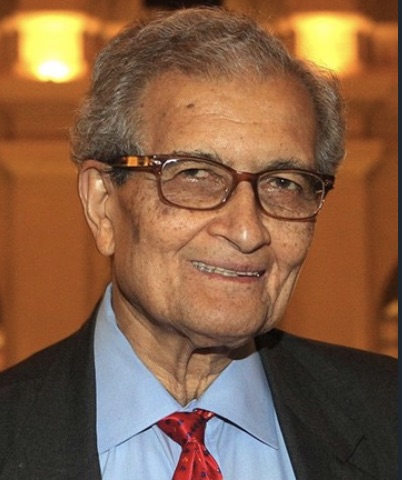
Amartya Sen is an Indian economist and philosopher who was born into a scholarly family on November 3, 1933, in Santiniketan, India. In 1940, at almost 8 years of age, Sen attended St. Gregory’s School in Dhaka, and in the fall of 1941, he was admitted to Patha Bhavana, Shantiniketan, where he completed his elementary education. The school had many progressive features, such as distaste for examinations or competitive testing. In addition, the school also stressed cultural diversity, embracing cultural influences from the rest of the world. In 1951, Amartya enrolled at Presidency College, Calcutta where he earned a B.A. in economics with a minor in mathematics, and stood first among all the graduating students. He later studied at Trinity College, Cambridge, and earned his Bachelor’s and Master’s degrees in economics from the University of Cambridge.
Sen has held various academic positions throughout his career, including teaching at the University of Oxford, the London School of Economics, and Harvard University. In those roles, he made significant contributions to the fields of welfare economics, social choice theory, and development economics.
Amartya Sen is best known for his work on the capability approach, which focuses on individuals’ freedom to lead lives they have reason to value. His perceptions were published in numerous influential books and articles, including Poverty and Famines (1981), Development as Freedom (1999), and The Idea of Justice (2010). The Dobb-Sen strategy, when applied to developing countries, focussed on maximizing investible surpluses, maintaining constant real wages and using the increase in labour productivity, attributable to technological change, to raise wages. He asserted that workers received no improvement in their standard of living despite their increased productivity. Sen’s papers in the late 1960s and early 1970s helped develop the theory of social choice, which first came into prominence in the work of economist Kenneth Arrow.
In 1998, Amartya Sen was awarded the Sveriges Riksbank Prize in Economic Sciences in Memory of Alfred Nobel (often referred to as the Nobel Prize in Economics) for his contributions to welfare economics and his work on the capability approach. Sen has been involved in public service and policy-related work, serving as an advisor to various governments and international organizations. He has been an advocate for social justice, human rights, and the reduction of global poverty. Apart from the Nobel Prize, Amartya Sen has received numerous other awards and honors throughout his career for his outstanding contributions to economics and philosophy.
Amartya Sen has been married to Emma Georgina Rothschild, a distinguished economic historian. He has also been an active essayist and has written on a wide range of topics beyond economics and philosophy. His work has had a profound impact on our understanding of poverty, development, and human well-being. He continues to be an influential figure in the fields of economics and social philosophy.
Reflecting on the state of poverty and its causes, he once opined, “Poverty is not just a lack of money; it is not having the capability to realize one’s full potential as a human being.”
